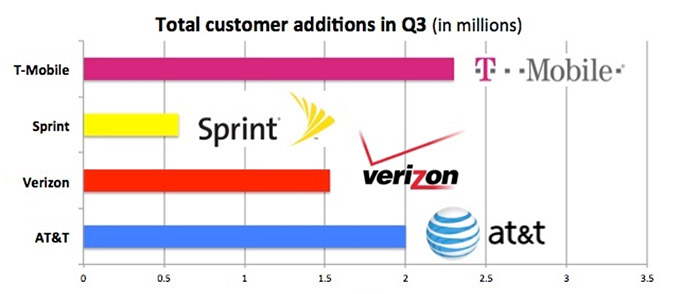 We’re sitting here wondering how much longer we’re going to have to refer to T-Mobile as the fourth largest carrier in the United States. Since John Legere’s take over of the carrier, they’ve been a forced to be reckoned with, which all stems from T-Mobile’s “Un Carrier” initiative.
We’re sitting here wondering how much longer we’re going to have to refer to T-Mobile as the fourth largest carrier in the United States. Since John Legere’s take over of the carrier, they’ve been a forced to be reckoned with, which all stems from T-Mobile’s “Un Carrier” initiative.
T-Mobile was having trouble climbing it’s way back up after a foiled merger attempt from AT&T in 2011 and 2012. Legere set the company up to succeed with his over the top and somewhat brash attitude towards competition. All the while attracting customers by shedding some of the baggage typical of wireless carriers.
By eliminating contracts, early termination fees and buying people out of their contracts people began to take notice. As T-Mobile continued to build out it’s network, added free music services, and lowered rates, people really started to take notice.
Geekwire reported on Wednesday that T-Mobile again topped rivals Verizon, AT&T and Sprint in quarter over quarter monthly, postpaid subscriber growth. Postpaid subscriber growth is the holy grail of metrics for wireless carriers. The belief is that post paid carriers have better credit worthiness than their prepaid brethren and because of that they are more valuable.
In Q3 T-Mobile added 1.2 million postpaid phone net additions. That was more than AT&T and Verizon Wireless combined. Sprint on the other hand lost (or churned) over half a million postpaid subscribers. Sprint is going through a reorganizing period with a new CEO who took the place of wireless industry veteran Dan Hesse who left the company after a failed merger attempt, also with T-Mobile.
Now it appears that T-Mobile may be left on their own, or at least as a business unit of Deutsch Telecom. If these numbers continue to grow in this direction T-Mobile may have nothing to worry about. Analysts predict that the company could take over Sprint as the third largest wireless carrier in the United States.

